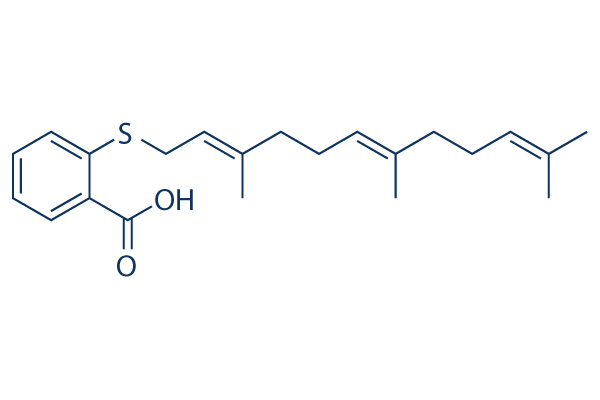| References: |
Salirasib inhibits the growth of human Ha-ras-transformed Rat1 cells, which correlates well with their inhibition for PPMTase. Salirasib inhibits Ras methylation in Rat-1 fibroblasts, Ras-transformed Rat-1, and B16 melanoma cells. Salirasib also reduces the levels of Ras in cell membranes and inhibits Ras-dependent cell growth, independently of methylation, but via modulation of Ras-Raf communication. In Ras-transformed EJ cells, Salirasib interferes with the activation of Raf-1 and MAPK and inhibits DNA synthesis. In Panc-1 xenografted nude mice, Salirasib (5 mg/kg i.p.) markedly inhibits tumor growth without systemic toxicity. In male Wistar rats, Salirasib (5 mg/kg i.p.) markedly inhibits thioacetamide-induced -induced liver cirrhosis. [5] In the dy(2J)/dy(2J) mouse model of congenital muscular dystrophy, Salirasib (5 mg/kg i.p.) attenuates fibrosis and improves muscle strength. [6] For the detailed information of Salirasib, the solubility of Salirasib in water, the solubility of Salirasib in DMSO, the solubility of Salirasib in PBS buffer, the animal experiment (test) of Salirasib, the cell expriment (test) of Salirasib, the in vivo, in vitro and clinical trial test of Salirasib, the EC50, IC50,and affinity,of Salirasib, For the detailed information of Salirasib, the solubility of Salirasib in water, the solubility of Salirasib in DMSO, the solubility of Salirasib in PBS buffer, the animal experiment (test) of Salirasib, the cell expriment (test) of Salirasib, the in vivo, in vitro and clinical trial test of Salirasib, the EC50, IC50,and affinity,of Salirasib, Please contact DC Chemicals. |























